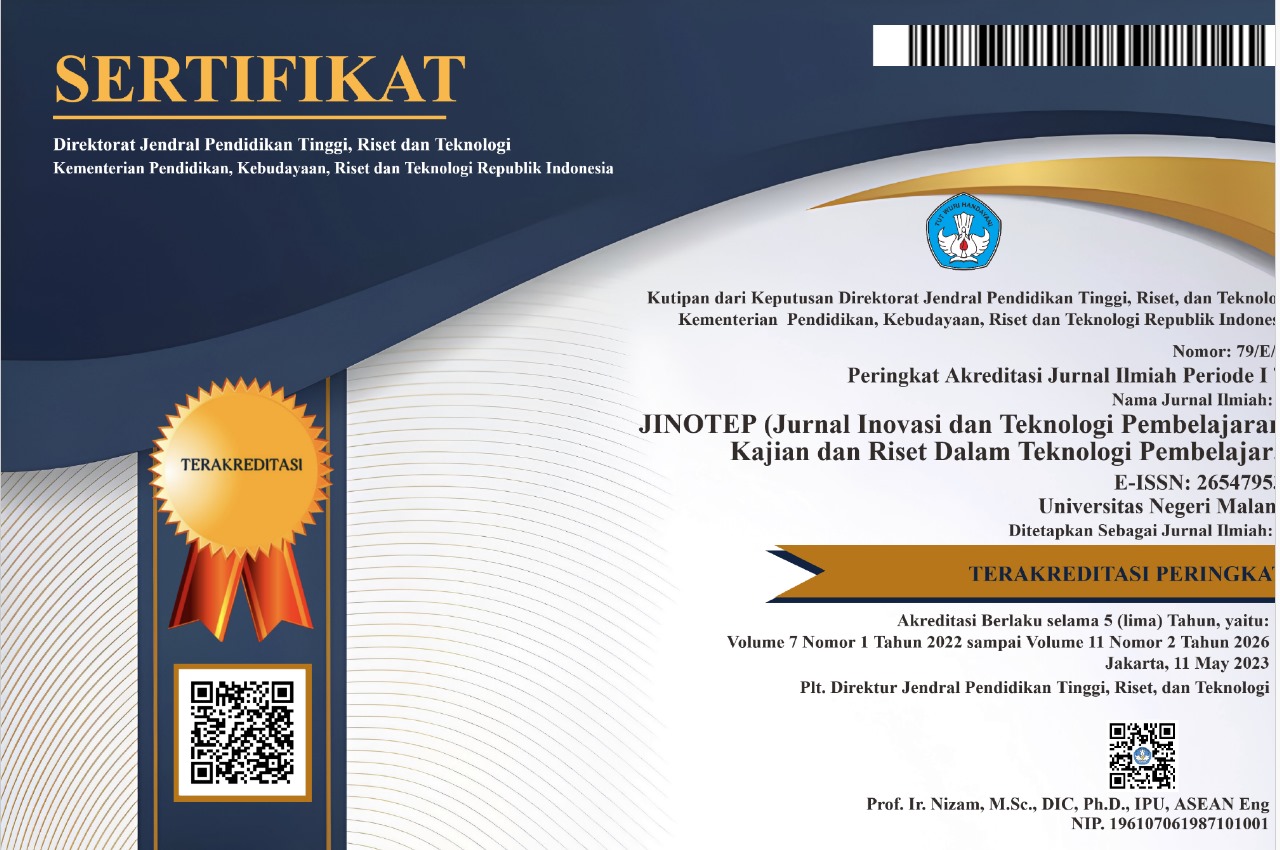Development of an Android-based virtual laboratory as a database learning media for vocational school
Abstract
Abstract: Tujuan pengembangan dan penelitian ini adalah menghasilkan produk laboratorium virtual berbasis android sebagai media pembelajaran basis data kelas XI SMK dilengkapi buku petunjuk penggunaan “Vlab base” dan meningkatkan pemahaman serta hasil belajar siswa pada topik pengelolaan tabel pada basis data menggunakan Bahasa SQL. Prosedur pengembangannyamenggunakan metode Research and Development (R&D) dan pendekatan pengembangan aplikasi model waterfall. Hasil validasi dari ahli media mencapai prosentase 92 (sangat layak), ahli desain 93 (sangat layak), dan ahli materi 94 (sangat layak). Uji kepraktisan mencapai prosentase 95 (sangat layak), kelompok kecil 90,67 (sangat layak), dan uji coba kelompok besar 93 (sangat layak) yang mempermudah siswa belajar dan praktikum mandiri memahami pengelolaan database berkategori sangat layak dan dapat digunakan guru dalam pembelajaran. Hasil pre dan post test siswa meningkatkan nilai hasil belajar siswa sebesar 100% berdasarkan kriteria efektivitas ketika digunakan dalam pembelajaran.
Abstract: The goal of this research and development is to create an Android-based virtual laboratory product as a database learning medium for class XI Vocational School equipped with a manual for using "Vlab base" and to improve understanding and results of student learning in the topic of managing tables in databases using SQL language. The development procedure employed the research and development (R&D) method to create Android-based learning materials and the waterfall model application development approach. The validation results are 92% (very feasible) from the media experts, 93% (very decent) from the design experts, and 94% (very decent) from the material experts. The practicality test reaches 95% (very feasible), the small group reaches 90.67% (very feasible), and the large group trial obtains 93% (very feasible), making individual practice and learning simpler for pupils to understand database management that is categorized as very feasible and can be used by teachers in learning. Based on the criteria of effectiveness for learning, the results of the students' pre-test and post-test showed a 100% improvement in the value of student learning outcomes.
Keywords
Full Text:
PDFReferences
Ada, M. B. (2017). Using mobile learning and social media to enhance learner feedback: Some empirical evidence. Journal of Applied Research in Higher Education, 9(1), 70–90. https://doi.org/10.1108/JARHE-07-2015-0060
Adrianto, D., Martani, M., Indriani, D., & Susanti, R. (2017). Development of online learning system for software laboratory center in bina nusantara university. ComTech: Computer, Mathematics and Engineering Applications, 8, 83. https://doi.org/10.21512/comtech.v8i2.3752
Agal, S., & Soni, J. (2017). An analytic method to study the comparative efficiency of different software model. American Journal of Software Engineering, 5, 16–19. https://doi.org/10.12691/ajse-5-1-2
Akdemir, Ö. (2016). Learning database through interactive mobile assisted instruction. Turkish Online Journal of Educational Technology, 2016, 6–14. https://api.elsevier.com/content/abstract/scopus_id/85007004655
Al-adwan, A. S., Al-madadha, A., & Zvirzdinaite, Z. (2018). Modeling students ’ readiness to adopt mobile learning in higher education : An Empirical Study. 19(1). https://doi.org/10.19173/irrodl.v19i1.3256
Alshamrani, A., & Bahattab, A. (2015). A comparison between three SDLC models waterfall model , spiral model , and incremental / Iterative Model. 12(1), 2015. https://doi.org/10.1016/j.quascirev.2007.10.001
Boutaba, R., & Mitsuo, K. C. (2014). Recent trends in interactive multimedia computing for industry. February, 723–726. https://doi.org/10.1007/s10586-014-0349-0
Branovic, I., Markovic, D., Popovic, R., Tomasevic, V., & Zivkovic, D. (2013). Development of modular virtual lab for introductory computing courses. 2013 IEEE Global Engineering Education Conference (EDUCON), 1027–1031. https://doi.org/10.1109/EduCon.2013.6530234
Chen, C.-H., & Tsai, C.-C. (2021). In-service teachers’ conceptions of mobile technology-integrated instruction: tendency towards student-centered learning. Computers & Education, 170, 104224. https://doi.org/10.1016/j.compedu.2021.104224
Fikri, G. H., Ervina, E., & Nursulistiyo, E. (2022). Development of experiment module using physics virtual labs application in optics subject studies for secondary high school students. AIP Conference Proceedings, 2542, 060003. https://doi.org/10.1063/5.0103217
Gezgin, D. M. (2020). The effect of mobile learning approach on university students’ academic success for database management systems course. In Mobile Devices in Education: Breakthroughs in Research and Practice (pp. 68–86). https://doi.org/10.4018/978-1-7998-1757-4.ch005
Gunawan, G., Harjono, A., Hermansyah, H., & Herayanti, L. (2019). Guided inquiry model through virtual laboratory to enhance students’science process skills on heat concept. Jurnal Cakrawala Pendidikan, 38(2), 259-268. https://journal.uny.ac.id/index.php/cp/article/view/23345
Gupta, A. (2021). Comparative Study of Different SDLC Models. International journal for research in applied science and engineering technology, 9, 73–80. https://doi.org/10.22214/ijraset.2021.38736
Gupta, K. (2019). Development of industry 4.0 virtual lab for manufacturing engineering education. In Proceedings of the International Conference on Industrial Engineering and Operations Management (pp. 1857–1867). https://api.elsevier.com/content/abstract/scopus_id/85085931379
Herzog, J. (2015). Development of a Virtual Lab for Practical eLearning in eHealth. In Studies in Health Technology and Informatics (Vol. 212, pp. 103–110). https://doi.org/10.3233/978-1-61499-524-1-103
Istiqomah, S. N., Farida, I., & Irwansyah, F. S. (2022). Development of Android-Based Virtual Lab in Oxygen Gas Synthesis Experiment. 2022 8th International Conference on Wireless and Telematics (ICWT), 1–5. https://doi.org/10.1109/ICWT55831.2022.9935493
Kadir, A. (2019). Tuntunan praktis belajar database menggunakan MySQL. Andi yogyakarta. https://elibrary.bsi.ac.id/readbook/211847/tuntunan-praktis-belajar-database-menggunakan-mysql
Khairudin, M., Triatmaja, A. K., Istanto, W. J., & Azman, M. N. A. (2019). Mobile virtual reality to develop a virtual laboratorium for the subject of digital engineering. learntechlib.org. https://www.learntechlib.org/p/208536/
Khan, S. M. (2023). Waterfall Model Used in Software Development Reference: Software Requirements Engineering Waterfall Model. https://doi.org/10.13140/RG.2.2.29580.69764
Kocakoyun, Ş., & Bicen, H. (2017). Development and evaluation of educational android application. Cypriot Journal of Educational Sciences, 12, 58. https://doi.org/10.18844/cjes.v12i2.1938
Leinonen, T., Keune, A., Veermans, M., & Toikkanen, T. (2014). Mobile apps for reflection in learning : A design research in K-12 education. 123445. https://doi.org/10.1111/bjet.12224
Liu, C. C. (2022). Augmenting the effect of virtual labs with “teacher demonstration” and “student critique” instructional designs to scaffold the development of scientific literacy. Instructional Science, 50(2), 303–333. https://doi.org/10.1007/s11251-021-09571-4
Marlina. (2019). The development of learning module database with matter entity relationship diagram based blended learning in engineering faculty indonesia persada university Y.A.I Jakarta. International Journal of Recent Technology and Engineering, 8(1), 407–410. https://api.elsevier.com/content/abstract/scopus_id/85069711344
Odabasi, M. (2019). Science education and mobile learning: A content analysis review of the web of science database. International Journal of Emerging Technologies in Learning, 14(22), 4–18. https://doi.org/10.3991/ijet.v14i22.11744
Oktariyana. (2021). Design of mobile learning rhythmic gymnastics materials for high school/vocational high school levels as a distance learning media during the covid-19 pandemic. International Journal of Human Movement and Sports Sciences, 9(3), 394–402. https://doi.org/10.13189/saj.2021.090302
Qian, K. (2017). Learning database security with hands-on mobile labs. In Proceedings - Frontiers in Education Conference, FIE (Vol. 2017, pp. 1–6). https://doi.org/10.1109/FIE.2017.8190716
Qun, S. (2021). The development of mobile education resource database under the concept of ubiquitous learning. In Proceedings - 2021 13th International Conference on Measuring Technology and Mechatronics Automation, ICMTMA 2021 (pp. 725–728). https://doi.org/10.1109/ICMTMA52658.2021.00167
Pressman, R. S. (2012). Rekayasa perangkat lunak: pendekatan praktisi. Penerbit ANDI.
Sakya, A., Verma, A. A., Haripriya, K., & Dhanush, S. (2022). Development of virtual lab to solve problems in structural dynamics. In lecture notes in civil engineering (Vol. 171, pp. 569–587). https://doi.org/10.1007/978-3-030-80312-4_48
Soviana, A. (2018). Demotivation: the unseen side of vocational high school students’ motivation in learning english. Jurnal Pendidikan Humaniora, 6(1), 9–16. http://journal.um.ac.id/index.php/jph
Sugiyono. (2018). Metode peneiltian kuantitatif, kualitatif kombinasi dan r&d. In Alfabeta Bandung.
Tagliacane, S. V, Prasad, P. W. C., Zajko, G., Elchouemi, A., & Singh, A. K. (2016). Network simulations and future technologies in teaching networking courses: Development of a laboratory model with Cisco Virtual Internet Routing Lab (Virl). 2016 International Conference on Wireless Communications, Signal Processing and Networking (WiSPNET), 644–649. https://doi.org/10.1109/WiSPNET.2016.7566212
Umamah, N., Subchan, W., Puji, R. P. N., & Mahmudi, K. (2021). Assessing prior knowledge and needs assessment for virtual laboratorium development. IOP Conference Series Earth and Environmental Science. https://doi.org/10.1088/1755-1315/747/1/012094
Zhao, Y., Flanagan, E., Abbasi, H., Black, K., Wang, X., & Cardona, A. (2019, November). Development of a virtual lab in assistance of a fluid mechanics laboratory instruction. In ASME International Mechanical Engineering Congress and Exposition (Vol. 59421, p. V005T07A029). American Society of Mechanical Engineers. https://doi.org/10.1115/IMECE2019-10540
DOI: http://dx.doi.org/10.17977/um031v10i32023p212
Refbacks
- There are currently no refbacks.
Copyright (c) 2023 Riza Umami, Ibut Priono Leksono, Ujang Rohman

This work is licensed under a Creative Commons Attribution-ShareAlike 4.0 International License.
======================================================================
Jurnal Inovasi dan Teknologi Pembelajaran published by Universitas Negeri Malang in collaboration with the Asosiasi Program Studi Teknologi Pendidikan Indonesia (APS TPI) and Ikatan Profesi Teknologi Pendidikan Indonesia (IPTPI) with a MoU.
Publisher Address:
Educational Technology Laboratorium, Building D5, 1st Floor
Faculty of Education, Universitas Negeri Malang
Semarang St. No. 5, Malang City, East Java Province, Postal Code 65145
Email: jinotep.fip@um.ac.id
======================================================================

JINOTEP is licensed under a Creative Commons Attribution-ShareAlike 4.0 International License.
JINOTEP Statistics (Since July 13th, 2020)



.png)




.png)
1.png)
1.png)
4.png)
2.png)
1.png)
1.png)
.png)


_3.png)





1.png)
.png)